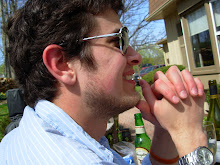 One of my favorite books to read is The Giver by Lois Lowry. Not to get all reader-response or anything but I love it because it means something specifically to me and reminds me of my role as a pastor/theologian. Let me explain:
One of my favorite books to read is The Giver by Lois Lowry. Not to get all reader-response or anything but I love it because it means something specifically to me and reminds me of my role as a pastor/theologian. Let me explain:In The Giver the protagonist is a young boy named Jonas who lives in a utopian society where there are no skinned knees and there is no experience of pain. In this society the time came, at the age of 12, when children became adults and were given what was to be there destiny, their place in the community, the role they were to perform for the good of the community. There were all kinds of jobs but only every great once in a while was there a replacement chosen for the most revered role of all, the role of the Giver. This lot befell Jonas.
The Giver was responsible for bearing all of the painful experiences and painful memories of the community so that the community didn't have to (Christ figure?). At the end of the day, Jonas decides that the joys that come with pain are worth the pain and so he releases the pain back into the community.
So where do I see the pastor/theologian? S/he is the Giver in the community. The weight of theological and biblical "pains" must be borne by them, they are the gatekeepers of the faith. Not everyone who claims Christ needs to master or even be aware of the myriad questions and theological problems the pastor/theologian is constantly confronted with. But the questions and problems must be dealt with by someone.
With this position is the utmost responsibility - deciding in what scenarios and relationships it is best for the community to be exposed to a little "pain." Do you keep bearing all of the burden to shield those in your care? Or do you let them in on a little of your experience? But when will it do good instead of doing harm? This is increasingly the role I find myself in as a pastor and as a student of the Scriptures.
As I tell most people who aspire to know more about the Bible...be very careful that you don't have false expectations about what this knowledge will bring. This knowledge is not primarily a gift but a burden. If we are interested in having our egos boosted by our knowledge then pick another field because the ethical weight of Scriptural knowledge can be a weight under which our pride and self-sufficiency are crushed.

